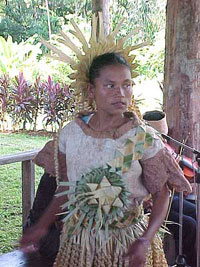Malaysian racial stability shaken by ethnic Indians
Malaysians don’t protest against the government openly running risks to be arrested. They just gripe about politics sipping tea in a café. Perhaps, the state of things will change soon.

About 10,000 minority ethnic Indians clashed with the Kuala Lumpur police for seven hours last Sunday on the streets to demand equal rights and a fairer share of national resources. They dispersed amid clouds of tear gas and water cannons. Some 250 people were arrested and three protest organizers were charged with sedition.
The unusual outpouring of anti-government dissent has shaken the foundations of Malaysia's reputation as a stable nation where three disparate races - Malays, Chinese and Indians - live in peace.
"It was a watershed-event," said S. Nagarajan of the Education, Welfare and Research Foundation, a nonprofit group that represents impoverished ethnic Indians. "It showed that Malaysians have overcome the fear of authorities. Even we were surprised by the scale and the spirit of the people."
This newfound boldness has government leaders worried about the country's fragile racial unity.
"It is easy for such a rally to become a racial issue or elicit responses from other races and evolve into a major conflict," said Deputy Prime Minister Najib Razak said.
Behind this concern is fear that overt ethnic tensions could scare away investors who form the bedrock of Malaysia 's booming economy.
Sunday's extraordinary street violence followed a demonstration Nov. 10 by about 30,000 opposition activists to demand electoral reforms. In September, 1,000 lawyers marched to the prime minister's office to demand judicial progress.
Analysts warn that anger among disgruntled Malaysians is reaching a boiling point over discrimination against minorities, lack of religious freedoms, political interference in the judiciary, unfair elections and corruption.
"It is a cry for attention," said Abdul Rahman Embong, a prominent sociologist who teaches at the National University of Malaysia. "We cannot take the issue of disaffection by various people for granted."
Besides complaining in coffee shops and grumbling on blogs, Malaysians have few avenues for venting, as the state controls the media and does not allow open discussion on racial issues.
Public gatherings of more than four people require permits; anyone deemed a threat to public order faces arrest.
The most worrisome problem for the government is the sense of disenfranchisement among ethnic Indians, who form about 8 percent of Malaysia's 27 million people. Malay Muslims, who control the government, are 60 percent and Chinese are a quarter of the population.
Most Indians are descendants of indentured ethnic Tamil laborers brought by British colonials in the 19th century to work in rubber plantations. They were poor then, living in shacks and earning daily wages. Not much has changed.
In fact, the Indians say they are worse off now, thanks to a 1971 affirmative action policy favoring Malays in jobs, education, government contracts and businesses. The ethnic Chinese grumble too, but they are less affected and most have flourished in private enterprise, controlling a large part of the national economy.
The government denies Indians are discriminated against, and says their living standards have vastly improved.
Government officials cite statistics to prove their case: The average monthly household income of Indians in 2004 was 3,456 ringgit (US$1,000; EUR 675), compared to the 2,711 ringgit (US$775; EUR 520) earned by Malays; about 2.9 percent of Indians lived below poverty line in 2004 compared to 39.2 percent in 1970.
But community leaders and activists dispute the official figures, saying they understate the poverty level among ethnic Indians and do not reflect reality: 90 percent of Indian workers are low-skilled laborers with little education who are treated with contempt by those in authority.
Indians are also stereotyped as alcoholics and gangsters.
According to Nagarajan of EWRF, Indians make up 5 percent of the civil service now compared to 21.5 percent in 1969. Only about 1.2 percent of corporate equity has been in the hands of Indians for the past three decades.
Sunday's demonstration was organized by a new group called the Hindu Rights Action Force, which tapped the Indian anger that has been building up over the years. Discontent grew most rapidly in the last six years when community leaders say Malaysia 's increasing Islamization began to infringe on religious rights.
The most obvious example has been a rash of demolitions of Hindu temples by the state. Authorities say they are illegal structures on state land. But the Indians, most of whom are Hindus, say some of the demolished temples were more than 100 years old, built with approval of British colonials.
"The anger has been building up," said Nagarajan. "The state has been arrogant and a bully, not realizing that even the marginalized can react."
Subscribe to Pravda.Ru Telegram channel, Facebook, RSS!


